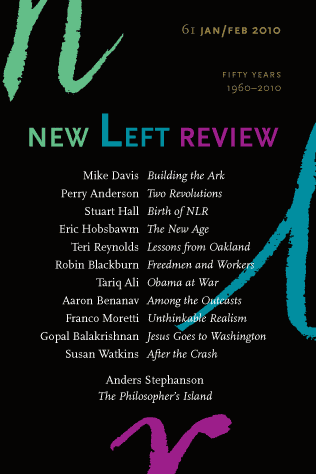What remains of the neo-liberal order after the implosion of 2008—with what implications for a journal of the left? Notes for a future research agenda, as NLR enters its quinquagenary year.
Copenhagen’s charades dispel any illusion that world rulers intend to deal with the environmental damage industrialization has caused. Mike Davis argues that green urbanism’s twining of social equality and ecological sustainability could offer an alternative starting-point.
Dispatches from an Oakland Emergency Department, testifying to the stark inequalities between public and private, insured and unprotected, that Democrat proposals will enshrine.
How to explain the opposed outcomes for communism in Russia and China, after 1989? Classes and leaders, anciens régimes and external settings, examined in comparative perspective.
From declamations in Cairo to silence over Gaza, occupation of Iraq and escalation in Afghanistan and Pakistan, Tariq Ali asks what has changed in us foreign policy since the departure of Bush.
Flexible morality and capitalist imperatives of the bourgeois fin-de-siècle, as captured in the obscure misdeeds of Ibsen’s protagonists.
The author of Age of Extremes discusses the major developments since the end of the Cold War. Amid the turbulence of capital’s advance, what larger problems should historians seek to understand?
The fate of post-bellum attempts to extend egalitarian impulses across race lines and factory floors, amid the sharpening class struggles of the Gilded Age.
NLR’s founding editor recalls the emergence of the British New Left out of the double conjuncture of 1956—Hungary and Suez—and identifies the cross-currents, cultural and political, that nourished its initial cohort.
Anders Stephanson on Susan Buck-Morss, Hegel, Haiti and Universal History. Did the Weltgeist drop anchor in revolutionary Saint-Domingue?
Gopal Balakrishnan on Reinhold Niebuhr, The Irony of American History. Consoling homilies for today’s liberal imperialists, from the theologian of the nuclear era.
Aaron Benanav on Jan Breman, The Poverty Regime in Village India. A sociologist explores the mechanisms of inequality shaping the life-world of informal labour.
